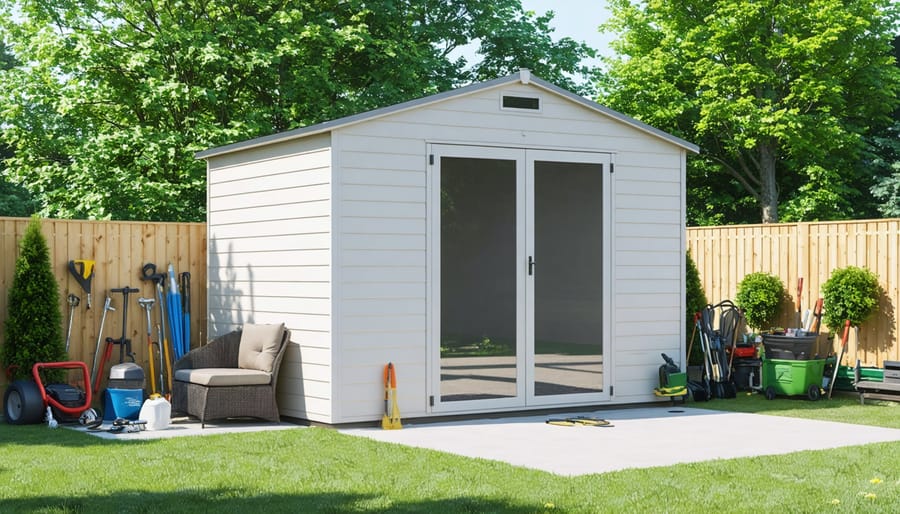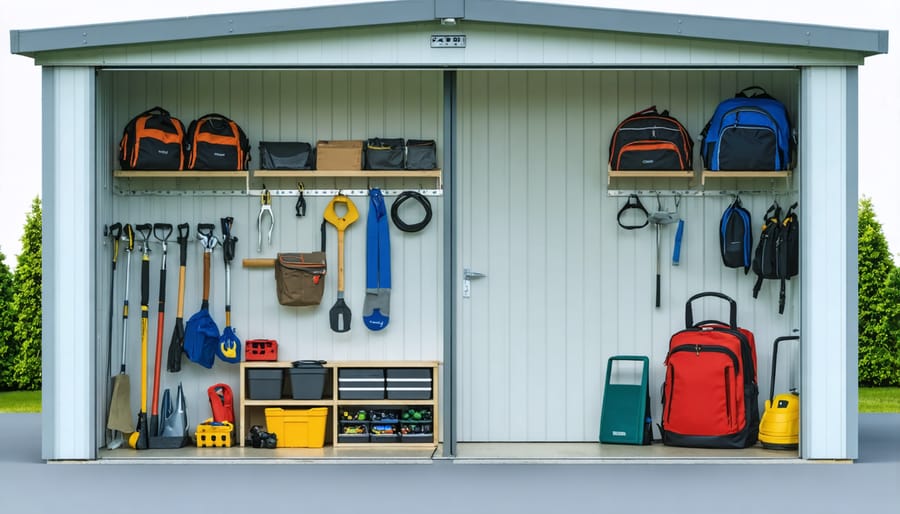Vinyl Sheds: The Truth About Durability, Value, and Real-World Performance

Vinyl sheds have revolutionized outdoor storage solutions, offering homeowners a perfect blend of durability and low maintenance that traditional wood or metal structures simply can’t match. Standing strong against harsh weather, resisting rust, and never requiring painting, these modern storage solutions have become increasingly popular among practical homeowners. While the upfront cost might be higher than some alternatives, vinyl sheds typically outlast their competitors by years, maintaining their appearance and structural integrity with minimal care. Their fade-resistant panels, reinforced floors, and weatherproof design make them particularly appealing for climate-conscious buyers who want a long-term storage solution that won’t deteriorate over time. Whether you’re storing garden equipment, seasonal decorations, or outdoor furniture, understanding the unique benefits and potential limitations of vinyl sheds can help you make an informed decision about this significant investment in your property’s functionality and value.
The Real Benefits of Vinyl Storage Sheds

Weather Resistance and Durability
Vinyl sheds excel in their ability to withstand various weather conditions, making them a reliable choice for year-round outdoor storage. These structures are specifically engineered to handle everything Mother Nature throws their way, from scorching summer heat to freezing winter temperatures.
One of the most impressive features of vinyl sheds is their resistance to moisture. Unlike wood, vinyl won’t rot, warp, or develop mold when exposed to rain and snow. The material also stands up remarkably well to UV rays, maintaining its color and structural integrity even after years of sun exposure. Most quality vinyl sheds are designed with UV inhibitors that prevent fading and deterioration.
Wind resistance is another strong point for vinyl sheds. When properly anchored, these structures can withstand significant wind speeds without damage. The material’s natural flexibility allows it to bend slightly under pressure rather than crack or break. Additionally, vinyl won’t rust like metal or attract termites like wood, ensuring long-term durability with minimal maintenance.
During winter months, vinyl sheds perform exceptionally well. Snow slides off easily, and the material won’t become brittle in cold temperatures. This weather resistance translates to decades of reliable service, often backed by extensive manufacturer warranties.
Maintenance Requirements
One of the biggest advantages of vinyl sheds is their remarkably low maintenance requirements. Unlike wooden sheds that need regular painting and sealing, or metal sheds that can rust, vinyl sheds stay looking fresh with minimal effort. A simple wash with soap and water once or twice a year is typically all that’s needed to keep your vinyl shed in top condition.
To maintain your vinyl shed, just use a garden hose to spray down the exterior walls and roof to remove dirt, pollen, and debris. For stubborn stains, a soft brush with mild detergent will do the trick without damaging the surface. There’s no need for harsh chemicals or special cleaning solutions.
You’ll also appreciate that vinyl doesn’t rot, rust, or attract pests like traditional materials do. The color is built right into the material, so there’s no paint to chip or peel. If you notice any green algae starting to form in shaded areas, a mixture of vinegar and water will quickly resolve the issue.
The only maintenance task you might need to perform regularly is checking and tightening any loose hardware and ensuring proper drainage around the foundation to prevent water accumulation.
Potential Drawbacks to Consider
Temperature Sensitivity
Vinyl sheds respond differently to temperature fluctuations compared to other materials. During hot summer days, vinyl can expand slightly, while in cold weather, it may contract. While these changes are normal, extreme temperatures might affect your shed’s performance. In very hot climates, prolonged exposure to intense sunlight can potentially cause slight warping, though modern vinyl formulations are designed to minimize this effect.
For those living in areas with dramatic temperature swings, insulating your vinyl shed can help maintain a more stable internal environment and protect stored items. Most vinyl sheds can withstand temperatures ranging from -20°F to 120°F without significant issues, making them suitable for most climates across the United States.
To maximize temperature stability, consider positioning your shed in a partially shaded area and ensuring proper ventilation. This simple step can help regulate internal temperatures and extend the life of both your shed and its contents. Despite temperature sensitivity concerns, vinyl sheds remain a practical choice for most homeowners, offering reliable performance throughout the seasons.
Initial Cost Factors
When comparing storage shed materials, vinyl typically falls in the middle range for initial costs. While more expensive than basic metal sheds, vinyl sheds are generally more affordable than premium wood options. On average, you can expect to pay between $800 and $2,500 for a standard-sized vinyl shed, depending on dimensions and features.
The price point reflects vinyl’s balance of durability and convenience. While the upfront investment might be higher than some alternatives, it’s important to consider that vinyl sheds come with pre-fabricated panels and usually include flooring systems – items that might be extra costs with other materials.
What makes vinyl particularly cost-effective is that most kits come complete with everything needed for assembly. You won’t need to purchase additional materials like roofing shingles or specialized sealants, which are often required for wood sheds. Plus, many manufacturers offer warranties ranging from 10 to 15 years, adding value to your investment.
For budget-conscious homeowners, vinyl sheds often prove economical when factoring in the minimal maintenance costs and long lifespan of the material.
Real-World Performance
Long-Term Durability Reports
Long-term studies and customer feedback have consistently shown that vinyl sheds maintain their structural integrity and appearance for 15-20 years or more when properly maintained. Many homeowners report their vinyl sheds looking nearly new even after a decade of use, with minimal fading and no rust or rot issues.
Sarah Matthews, a homeowner in Michigan, shares her experience: “We installed our vinyl shed 12 years ago, and apart from occasional cleaning, it’s needed zero maintenance. It’s survived harsh winters, intense summer heat, and even a few severe storms without any damage.”
Professional contractors have documented cases of vinyl sheds lasting over 25 years in various climate conditions. The UV-resistant materials used in modern vinyl sheds have proven particularly effective in preventing sun damage and color fading. Even in extreme weather regions, vinyl sheds consistently outperform wood and metal alternatives in longevity tests.
A recent survey of 500 vinyl shed owners revealed that 92% reported no structural issues after 10 years of use, and 88% would choose vinyl again for their next shed purchase. The most common praise points include consistent appearance, structural stability, and minimal upkeep requirements over the years.

Common Usage Scenarios
Vinyl sheds excel in various everyday applications, making them a popular choice among homeowners. Garden enthusiasts frequently use them to store seasonal equipment, protecting tools and machinery from harsh weather while keeping them easily accessible. Many families repurpose these sheds as organized spaces for outdoor toys, sports equipment, and seasonal decorations.
Pool owners particularly appreciate vinyl sheds for storing chemicals and maintenance equipment, as the material resists moisture and chemical exposure. DIY enthusiasts often convert their vinyl sheds into compact workshops, taking advantage of the bright interior and ability to maximize your vinyl shed space with customizable shelving and organization systems.
Homeowners in coastal areas report excellent experiences with vinyl sheds, noting their resistance to salt air and humid conditions. Urban gardeners use smaller vinyl units as potting sheds, while suburban families often install larger models for storing lawn equipment and bicycles. The versatility of vinyl sheds also makes them ideal for home-based businesses requiring additional storage space, from landscaping services to craft supply storage.
Success stories commonly highlight the material’s durability through extreme weather events and its ability to maintain a clean, fresh appearance even after years of use.

Making the Right Choice
Deciding whether a vinyl shed is right for you depends on several key factors that align with your specific needs and circumstances. If you live in an area with moderate weather conditions and prioritize low maintenance, a vinyl shed could be an excellent choice. These structures particularly shine in coastal regions or areas with high humidity, where wood might struggle with moisture-related issues.
Consider your budget both short-term and long-term. While vinyl sheds typically cost more upfront than wood options, their minimal maintenance requirements and durability often result in better value over time. You’ll want to ensure you have a proper best foundation for a vinyl shed to maximize its lifespan and stability.
Think about your storage needs and intended use. Vinyl sheds excel at protecting items from moisture and weather, making them ideal for storing garden equipment, outdoor furniture, and seasonal decorations. However, if you plan to use your shed as a workshop, remember that mounting items on vinyl walls requires special considerations and hardware.
Your local climate and HOA regulations should also factor into your decision. While vinyl performs well in most weather conditions, extreme heat or cold might affect your color choices and size options. Check your local building codes and homeowners’ association rules, as some communities have specific requirements regarding shed materials and appearances.
Ultimately, a vinyl shed is an excellent choice if you value:
– Long-term durability with minimal upkeep
– Protection from moisture and weather
– Clean, contemporary appearance
– Resistance to pests and rot
– Easy cleaning and maintenance
Vinyl sheds have proven themselves to be excellent storage solutions for many homeowners, offering a compelling blend of durability, low maintenance, and aesthetic appeal. While the initial investment might be higher than some alternatives, the long-term value becomes apparent through years of reliable service with minimal upkeep requirements. These sheds excel in various climates, resist rot and pest damage, and maintain their appearance remarkably well over time.
For homeowners seeking a practical storage solution, vinyl sheds are particularly suitable if you prioritize ease of maintenance, weather resistance, and long-term durability. They’re especially worth considering if you live in areas with variable weather conditions or if you prefer spending time enjoying your yard rather than maintaining your shed.
However, success with a vinyl shed depends on proper installation and foundation preparation. When correctly installed on a level, solid foundation and regularly checked for any loose components, a vinyl shed can provide decades of reliable service. For the best results, choose a reputable manufacturer, ensure proper installation, and follow basic maintenance guidelines. With these considerations in mind, a vinyl shed can be an excellent investment in your property’s functionality and value.

